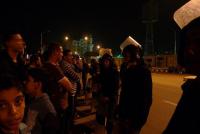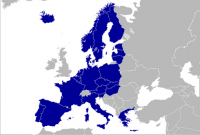-
Swiss voters reject automatic deportation of foreigners who committed crimes
Swiss voters, in a Saturday referendum, rejected a proposal by a nationalist party automatically to deport foreigners who commit even low-level offenses such as traffic violations. Public opinion indicated a tight vote, but the measure was easily defeated by a margin of 58.9 percent to 41.1 percent. EU leaders welcomed the referendum result.
-
-
Two former Mexican presidents: Trump “like Hitler” in stirring hatred along ethnic lines
Two former presidents of Mexico, Felipe Calderon and Vicente Fox, said Donald Trump was stirring up hate along ethnic lines in a manner similar to that of Hitler. In Twitter message to his followers ahead of Super Tuesday vote, Trump quoted the words of Italy’s fascist dictator Benito Mussolini.
-
-
Mexicans worry Trump’s rhetoric will poison U.S.-Mexico relations
Donald Trump’s pledge to build a wall along the U.S.-Mexico border – and make Mexico pay for it – has elicited pointed criticism from two former Mexican presidents, Felipe Calderon and Vicente Fox. Even if the border wall is never built, leading politicians and academics in Mexico worry that Trump’s comments will lead to harsher U.S. border policy and disrupt the process of growing economic and political ties between the two countries, a process which began two decades ago with the NAFTA agreement.
-
-
Changes in EU policy needed to address migrant crisis: Experts
More than 3,700 people were believed to have drowned in the Mediterranean during 2015. Alongside these tragic developments, increasing levels of migration along the Balkan route have been met by border closures within the EU, with growing tensions exacerbating humanitarian challenges across the wider region. EU Member States have struggled to adopt a unified approach to handling the issue. New study indicates deterrent measures such as anti-smuggling are ineffective and an alternative is needed.
-
-
Immigration overall not a source of terrorism: Study
Migration is overall not a source of terrorism, according to new research. In fact the study indicates that more migration could create a decrease in the number of terrorist attacks. However, the research suggests some terror attacks can be linked to migration from terror-prone states.
-
-
Texas to re-classify immigrant detention centers as child-care facilities
In 2015 a judge ordered Texas to shut down two immigration detention centers – but in order to escape implementing the judge’s order, Texas is considering re-classifying the two detention centers as “child-care facilities.” The Texas Department of Family and Protective Services had to address a July 2015 decision from federal Judge Dolly Gee. Gee ruled that the country’s three family detention centers (a third facility is in the process of being shut down) were holding children in “deplorable conditions” that “failed to meet even the minimal standard” for a safe and clean environment for children.
-
-
NATO fleet deployed in Aegean Sea to stop refugees coming from Turkey

NATO has deployed its fleet to the Aegean Sea in an effort to end the flow of refugees crossing from Turkey in order to enter the EU zone. The deployment, announced yesterday, will involve warships, rather than coast guard boars, meet refugee boats outside Greece’s territorial waters.
-
-
U.K.'s citizenship tests act as barriers to naturalization
Citizenship tests are requiring immigrants to become “super-citizens” and act as barriers to naturalization, according to new research. In the first academic article to consider the experience of people taking the tests, researchers found that they provided immigrants with little useful or practical knowledge and were considered disparaging by requiring them to know things that citizens-by-birth would not.
-
-
Fixing failed SBInet: Contract delays, quality issues at CBP
Since DHS secretary Janet Napolitano in 2011 cancelled the failed SBInet program, CBP’s Office of Technology Innovation and Acquisition (OTIA) has awarded defense contractors approximately $186,000,000 to replace it. Mark Borkowski’s Office of Technology Innovation and Acquisition (OTIA) has created problems which directly impacting safety and productivity of Border Patrol agents: The needlessly delayed Integrated Fixed Towers (IFT) project has once again placed Border Patrol agents in harm’s way because the men and women who risk their lives patrolling the line still do not possess sophisticated surveillance technology to fight the drug cartels, human traffickers, and potential terrorists crossing our international borders.
-
-
Calls for banning Muslims from entering U.S. impractical, harmful: Expert

Duke sociologist Christopher Bail, who studies how anti-Muslim organizations use social media, says that calls to ban immigration of Muslims to the United States are missing two important points. First, there is no conceivable mechanism whereby the United States could identify Muslims — short of visual cues such as headdress or religious garb, which are not worn by most Muslims. Second, and perhaps more importantly, it is surprising that people think that groups such as ISIS could not disguise terrorists they want to send to the United States as non-Muslims.
-
-
Five European countries face removal from Visa Waiver program
DHS has told five countries – France, Belgium, Germany, Italy, and Greece – that they have until Monday, 1 February, to fix a security flaw – DHS described it as a “crucial loopholes”— in their passport stems. If they fail to do so, they will be removed from the Visa Waiver program. The move will affect millions of European citizens.
-
-
Sweden will expel 80,000 refugees whose asylum applications were denied

Sweden’s interior minister Anders Ygeman said on Wednesday that Sweden plans to expel up to 80,000 asylum seekers who entered the country in 2015 and whose applications had been rejected. Ygeman noted that normally expulsions are carried out using commercial flights, but in light of the large numbers involved, specially chartered aircraft would be used – and the process would take a few years.
-
-
U.S. undocumented population declines
In a just-released report, the Center for Migration Studies of New York (CMS) finds that the U.S. undocumented population has fallen below eleven million for the first time since 2004. The report also offers evidence that the Mexican-born undocumented population continues to decline, falling by more than 600,000 since 2010. The study further describes trends in the undocumented population over the past few years for selected countries of origin and states of residence.
-
-
Greece to be expelled from Schengen free travel zone agreement

Greece is likely to be expelled or suspended from the Schengen free movement zone as European leaders appear to have concluded that the Greek government does not have to will, or the ability, to control the country’s borders. EU have been pressuring Greece for months to stem the flow of refugees from Turkey into Greece – and from Greece to other EU countries – but to no avail.
-
-
Migration crisis might destroy Europe: French PM Manuel Valls

Europe cannot take in all the refugees fleeing war-torn Syria and Iraq and the migration crisis is putting the European Union in grave danger, the French Prime Minister Manuel Valls has said. Valls, speaking at the World Economic Forum in Davos, said that “The concept of Europe that our founding fathers had…is in very grave danger,” and that Europe needed to take urgent action to control its external borders. “Otherwise,” he said, “our societies will be totally destabilized.”
-
More headlines
The long view
The “Invasion” Invention: The Far Right’s Long Legal Battle to Make Immigrants the Enemy
By Molly Redden
The Trump administration is using the claim that immigrants have “invaded” the country to justify possibly suspending habeas corpus, part of the constitutional right to due process. A faction of the far right has been building this case for years.
